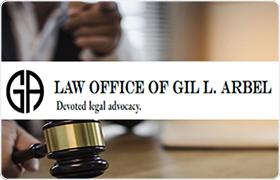Burbank Misdemeanor Lawyer, California
Sponsored Law Firm
-
 x
x

Click For More Info:
-
Law Office of Gil L. Arbel
28541 Conejo View Dr. Agoura Hills, CA 91301» view mapCriminal Defense Law Devoted Legal Advocacy
At the Law Offices of Gil L. Arbel, we understand that legal matters can be intimidating and complicated, which is why it is crucial to take an informed approach.
800-961-3980
Daniel Moaddel
✓ VERIFIEDCriminal, DUI-DWI, Misdemeanor, Felony, Immigration
Moaddel Law is a criminal defense firm that provides comprehensive service from start to finish.
Daniel Moaddel is a criminal defense attorney serving Los Angeles, California.
Sharon Paris Babakhan
Criminal, DUI-DWI, Felony, Misdemeanor
Status: In Good Standing Licensed: 13 Years
FREE CONSULTATION
CONTACTFREE CONSULTATION
CONTACTBrian D. Lerner
Visa, Deportation, Immigration, Misdemeanor
Status: In Good Standing Licensed: 32 Years
FREE CONSULTATION
CONTACTKaren Goldstein
Misdemeanor, Felony, DUI-DWI, Criminal
FREE CONSULTATION
CONTACTGarret Weinrieb
Felony, Misdemeanor, DUI-DWI, White Collar Crime
Status: In Good Standing Licensed: 21 Years
FREE CONSULTATION
CONTACTFREE CONSULTATION
CONTACTSeppi Esfandi
White Collar Crime, Misdemeanor, Felony, Criminal
Status: In Good Standing Licensed: 24 Years
FREE CONSULTATION
CONTACT Gil L. Arbel Agoura Hills, CA
Gil L. Arbel Agoura Hills, CA Practice AreasExpertise
Practice AreasExpertise


